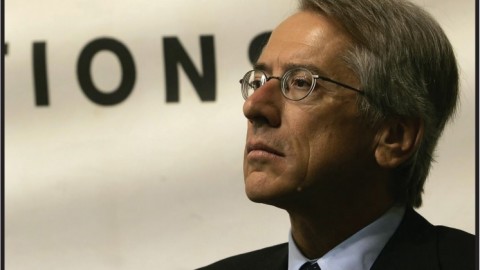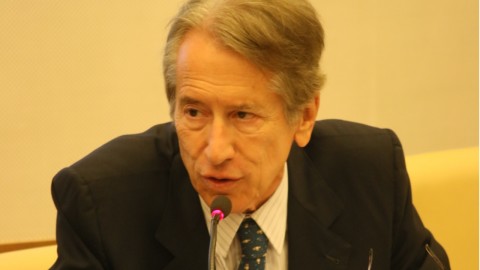Roma, 26/10/2017
Luiss, Viale Romania 32
I)The global landscape.
In the West, it is difficult to escape the pessimism that pervades global affairs, due to:
*Russia’s invasion of Crimea ;
*“frozen conflicts” and Moskow’s threats against Euro- Atlantic security interests and liberal principles ;
*crises in the European Union with Brexit, Catalunia ,and new political scenarios in Germany, Austria, Czeck Republic;
*ongoing conflicts in Middle East : the Syrian catastrophe, an Islamic State deafeated but not destroyed; Iraqi, Syrian, Turkish , Iranian Kurdistans ; Iranian messianic vision of a global Shia leadership in the muslim world and beyond; Sunni- Shia unsettled disputes;
*North Korea’s and Iran’s nuclear and cyber capabilities ;
*Cyberthreats from State and non- State actors;
*migrations ; terrorism.
Liberal democracy appears to be unraveling and to have lost its global momentum—helped along by resurgent authoritarianism and weakened values in our societies.
II)Freedom House yearly Report.
Freedom House provides an annual evaluation of the state of global freedom as experienced by individuals, according to two broad categories:
1) political rights to participate freely in the political process, the right to vote freely for distinct alternatives , compete for public office, join political parties and organizations, and elect representatives accountable to the electorate;
2) civil liberties,freedoms of expression and belief, associational and organizational rights, rule of law, and personal autonomy without interference from the state.
Freedom House considers the presence of legal rights, but it places a greater emphasis on whether these rights are implemented in practice. Freedom House’s term “electoral democracy” differs from “liberal democracy” in that the latter also implies the presence of a substantial array of civil liberties. Countries cathegorize as “Free” when they qualify as both electoral and liberal democracies. By contrast, “Partly Free” countries may qualify as electoral, but not liberal, democracies.
According to these parameters:
· 2016 marked the 11th consecutive year of decline in global freedom.
· There were setbacks in political rights, civil liberties, or both, in a number of countries rated “Free” by the report, including Brazil, the Czech Republic, Denmark, France, Hungary, Poland, Serbia, South Africa, South Korea, Spain, Tunisia, and the United States.
· Of the 195 countries assessed, 87 (45 percent) were rated Free, 59 (30 percent) Partly Free, and 49 (25 percent) Not Free.
· The Middle East and North Africa region had the worst ratings in the world in 2016, followed closely by Eurasia.
As a result the year 2016 was characterized by the erosion of democratic institutions, and left few positive trends to highlight. Of the 11 countries calling special attention, only one denoted improvement.
III) How bad the perspective is for Liberal democracies?
Dozens of newer democracies in the developing world are struggling to put down roots, and older democracies—including the United States and some EU Member States—are troubled. The theory that democratic transitions naturally move in a positive direction and that established democracies don’t tumble backward no longer holds.
The gloom has become so thick, however, that it obscures reality. A number of analysts either overstate or oversimplify negative trends and overlook some positive developments.
They too easily cast U.S. President Donald Trump’s rise, the Brexit vote, and the mainstreaming of illiberal movements in Europe as part of an all-embracing, global counterrevolution against liberal principles.
Today’s intensifying apprehension is infused with nostalgia for the 1990s and early 2000s as a period of strong global commitment to freedom .Yet even then, illiberal forces were asserting themselves. In 1997 Fareed Zakaria warned of the raise of illiberal democracies, arguing that “half of the ‘democratizing’ countries in the world today are illiberal democracies.”
Even at the height of democracy’s wave at the end of the 1990s, the Middle East remained almost entirely a democracy-free-zone, the former Soviet Union was headed much more toward authoritarianism than democracy, and Africa’s widely celebrated “new leaders,” including Rwanda’s Paul Kagame and Uganda’s Yoweri Museveni, were antidemocratic strongmen. East Asia also had many well-entrenched dictatorial systems.
Those who despair the future of democracy tend to focus on a select set of highly visible negative developments—especially the searing failure of the Arab Spring and the rise of illiberal forces in Europe and the United States.
Yet in other important regions the picture is different.
The Economist Intelligence Unit’s Democracy Index for Asia and Africa show a modest improvement over the last decade.
The quality of democracy has improved in places such as Burkina Faso, Gambia, Ghana, Guatemala, the Ivory Coast, Sri Lanka, Tunisia, and Ukraine in spite of the serious problems they have faced.
In Latin America, the illiberal wave in the early 2000s is receding.
Colombia and Nepal have both brokered peace accords with rebel movements, ending decades of civil war, and have seen record numbers of citizens commit to democratic institutions and norms.
In Africa and Latin America, public support for core democratic values has remained high and steady over the last decade. According to the Afrobarometer over 70 percent of Africans reject nondemocratic forms of government. And despite the disappontment of the Arab Spring, the World Values Survey shows that support for democracy in the Middle East is still on a gradual, upward trajectory.
It is certainly true that various authoritarian governments have become more audacious in geopolitical pursuits outside their borders. Look at the Russian invasion of Ukraine, Moskow’s and Teheran’s involvement in Syria, Russian political meddling in the United States and Europe, China’s sharper edge in the South China Sea, Iran’s heightened role in Iraq, Syria, and Yemen. Greater assertiveness by authoritarian powers has many negative implications for the future of global democracy. This does not mean, however, that authoritarianism, as a type of political regime, is necessarily going to succeed.
Most authoritarian regimes struggle with profound internal challenges and weaknesses that often spur them to become more assertive outside their borders.
Foreign adventurism can help authoritarian leaders distract their own people from their domestic failings. Putin’s inability to carry out effective economic and anticorruption reforms, combined with the devastating effect of falling oil prices on the Russian economy, has pushed him to find other ways to maintain his domestic legitimacy.
Although China has sustained its economic miracle, its visible corruption and slower economic growth in recent years have forced President Xi Jinping to nurture other sources of legitimacy—a tougher foreign policy is one result.
In short, although liberal democracy is facing greater cross-border challenges from authoritarian powers, the central threat is not authoritarianism’s success as a political system. It is rather the instability that such model produces regionally and globally.
Undoubtedly, there is much ground for discouragement. The overall state of democracy in the world is much less healthy than predicted during the early years of democracy’s third wave. Yet a sense of perspective is needed: the past was not as bright as many seem to remember, democracy is holding steady in some regions, and most people are more interested in accountability than illiberalism.
The tendency to view global developments through the lens of antidemocratic counterrevolution provides a distorted picture. A more nuanced perspective might not dispel the gloom, but it may help prevent a lapse into disabling pessimism and, consequently, the mistake of giving up on supporting democracy as part of Western foreign policy.
IV).The Rule of Law
The Rule of Law is the essential and constitutive element of liberal democracies . The whole EU architecture and the external relations of the Union and its member States are based on it. TEU Art. 2: ”The Union is founded on the values of respect for human dignity, freedom, democracy, equality, the rule of law and human rights”. According to art. 2, these are “values”, and not mere “principles” like in previous Treaties. Insofar it originates from constitutional traditions belonging to each member State, the Rule of Law is the overarching, constitutive norm of the Union.
This truth appears self evident when we read the Lisbon Treaty, EU Councils deliberations, CFSP guidelines and statements. However there are few areas of European policies where deeds don’t match words as much as it happens with the promotion of human rights and Rule of Law.
It was that specific concern to convince two year ago Marco Pannella, the outstanding figure engaged all his life in the promotion of freedoms and human rights, to launch the Global Committee for the Rule of Law, aimed at raising awareness among like minded countries and civil societies. Enshrined in the 2000 UN Millennium Declaration is the principle that Human Rights and Rule of Law are essential pillars for peace, development and democracy. According to the definition given by the UNSG in his 8/23/2004 Report to the UNSC “ Rule of Law is “a principle of governance in which all persons and entities, including the State itself, are accountable to laws promulgated, consistent with international human rights norms and standards”
Disregard for the Rule of Law and for the Right to Know is the common denominator when settlements by force substitute settlements by law, and arbitrary power overcomes reliance on law. In that sense as well there is an immediate need to strive for transparency and accountability. A clearly defined and agreed Right to Know should therefore become a fundamental principle for the international community. The problem is that this Right seems to be still in its infancy. It has not yet reached maturity. It encounters a resilient opposition from those who prosper in secretive environments; it is neglected whenever accountability remains at the margin of a decision making process; whenever freedom of information is minimal or inexistent: no better opportunity for masters of power who show their contempt for the Rule of Law.
 wikipedia
wikipedia
